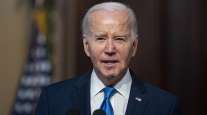Trucking Opposes New Federal Regulations Requiring Workplace Posters About Unions
This story appears in the Sept. 5 print edition of Transport Topics.
Trucking is attacking a federal regulation issued last month that will require employers to hang posters informing workers about their rights to form and join unions.
“I find it somewhat difficult to believe that people are not aware of these rights today,” Prasad Sharma, deputy chief counsel at American Trucking Associations, told Transport Topics.
Effective Nov. 14, employers will be required to post the notices in places where other federally mandated notices are posted, including ones about disability and minimum-wage laws, the National Labor Relations Board said in a statement following its Aug. 25 vote.
“The board believes that many employees protected by the [National Labor Relations Act] are unaware of their rights under the statute and that the rule will increase knowledge of the NLRA among employees, in order to better enable the exercise of rights under the statute,” NLRB wrote in the regulation.
The rights to be outlined on the notice include rights to bargain collectively for wages and conditions, to distribute union information and to refrain from union activities, the agency said. It is to be similar to a notice required for U.S. government contractors, and agricultural, rail and airline employers are exempt.
The NLRB decision to require the posters is meant to increase union participation at a time when it is at its lowest point in decades, and the agency indicated such when it proposed the regulation, said ATA’s Sharma.
“There’s a theory that that decrease [in union membership] is the result of the population’s lack of knowledge of their rights under the NLRA,” Sharma said, adding that he does not believe that to be true.
NLRB scaled back provisions of its initial proposal that would have required employers to distribute the union rights information via e-mail, voicemail, text messaging and related electronic means, the agency said.
Sharma does not predict that trucking will have any major problems complying with the regulation.
After the requirement was proposed in December, ATA submitted comments to the agency, calling it a proposal to “require precisely what Congress has repeatedly chosen not to require, with respect to mandatory posting of notices under the National Labor Relations Act.”
“In an industry that has seen several of its unionized carriers fail in the past decade, this outright promotion of union interests is a threat to the hundreds of thousands of carriers that remain vital to the country’s economic recovery,” ATA wrote.
“We think this is beyond the intent of Congress and beyond the NLRB’s statutory authority,” Sharma said.
The Teamsters union cheered the regulation.
“This is a reasonable reform that gives workers clear guidelines about their basic rights under federal labor law,” Teamsters General President James Hoffa said in a statement. “Employers have only one reason to oppose this rule: They don’t want their workers to know about their legal protections and fundamental right to organize into [a] union.”
Owner-Operator Independent Drivers Association spokeswoman Norita Taylor said the group does not “have anything to add to the discussion” about the new regulation.



